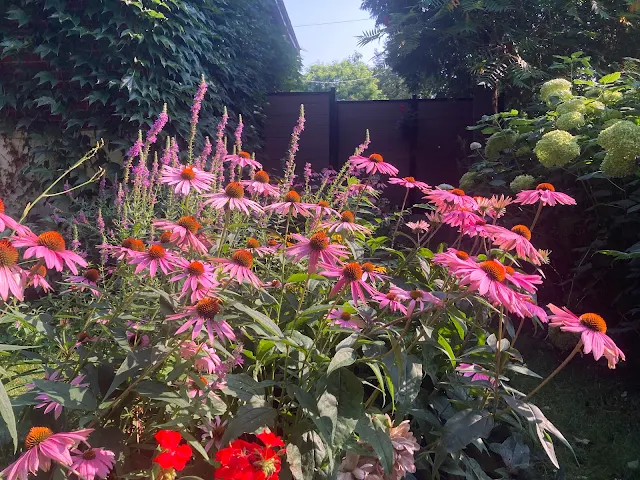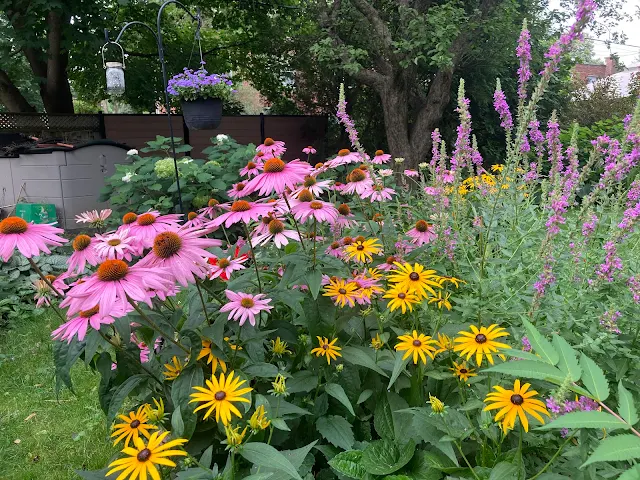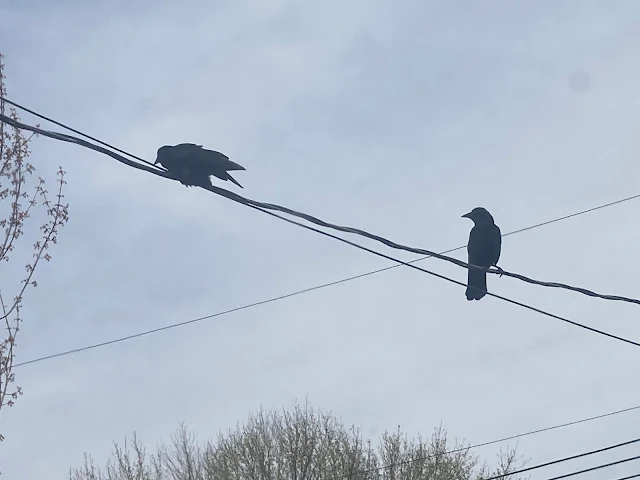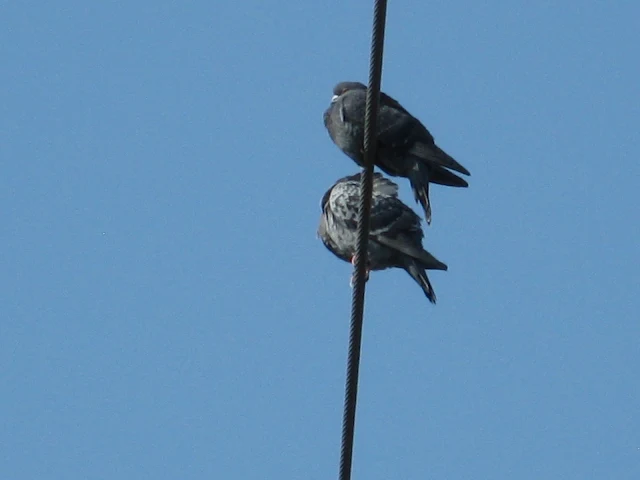Thursday, August 1, 2024
Wednesday, July 31, 2024
"The Hunter" by William Carlos Williams
In the flashes and black shadows
of July
the days, locked in each other's arms,
seem still
so that squirrels and colored birds
go about at ease over
the branches and through the air.
Where will a shoulder split or
a forehead open and victory be?
Nowhere.
Both sides grow older.
And you may be sure
not one leaf will lift itself
from the ground
and become fast to a twig again.
Tuesday, July 30, 2024
On poetry, the soul, and AI (1)
 |
| A crow looks at its shadow, April 2024 |
If you compare poetry/poets/the critical discussion of poetry today with what poetry was like even twenty years ago, then poetry today seems of slight importance, it seems isolated, archaic, and sometimes a self-indulgent form of writing. I heard W.H. Auden read his poems at McGill University, there is no equivalent of W.H. Auden today. Louis Dudek invited Ezra Pound to Montreal's Expo 67, there is no equivalent to either Louis Dudek or Ezra Pound in today's world. In the 1960s and 70s books by Robert Lowell, John Berryman, Anne Sexton, and others were reviewed in TIME magazine, these poets and their books were known by average people. Poetry was respected, but in today’s world nothing is respected; we have no great poets who are known by the general public as we had in the past, no Allen Ginsberg, no Pablo Neruda, no David Jones, no T.S. Eliot, no Ezra Pound, no W.B. Yeats, no Walt Whitman, no Matthew Arnold. And now even Artificial Intelligence claims it can write poems.
What separates poetry, the writing of poetry, from artificial
intelligence, is that humans have a soul and artificial intelligence has
no soul. Poetry is the voice of the human soul and
AI will never, can never, have a human soul or a facsimile soul. Poetry returns
us to the soul—it is the voice of the human soul; it is the soul’s DNA.
But poetry is beyond AI; artificial intelligence is in the realm of the known, of sorting through hundreds of billions of bits of information to arrive at something that is apparently new; but poetry is always in the domain of the soul, the unknown, while AI is always in the realm of the known. And if you question AI about writing poetry you will get a kind of intelligence, without humour or depth, knowledge made up of what is online, insisting that it can write a poem although it is really a synthesis of what has already been written; let’s say it is artifice without authenticity. AI is like a spoiled child talking as though it is always right and never makes mistakes, but what is speaking is a reflection or representation of what is online and of the consciousness of the person or people, who programmed AI. So far, in my discussions with ChatGPT, I have not seen anything remarkable or extraordinarily intelligent or original. AI cannot talk about the human soul because it has no soul, and perhaps it has taken us to this point, of AI, to return to the meaningful value of poetry, that it is an expression of the human soul.
Can AI have synchronistic experiences, archetypes, dreams, nightmares, fantasies, memories, false memories, recovered memories, a shadow, oceanic experiences, mysticism, sexuality, intuition, hunches, humour, ecstasy, desire, despair, sorrow, grief, forgiveness, insight, emotions, lust, self-reflection, suicidal thoughts, empathy or compassion, or any other form of the complexity of consciousness that has motivated human beings to explore, create, or go beyond its current level of consciousness. Can AI have an unconscious mind? AI will admit that it cannot have these expressions of human consciousness, but AI also equivocates, it maintains, it insists, that the little ditties it can come up with and call poetry are poems, but these ditties are computer written lines that are not original or even real poems, for a minute they are an amusement but after a minute they are not even interesting to read. The inevitable future of poetry lies in what poetry has always been — the great theme of poetry is our journey to self-awareness — and this is the expression of the human soul.
Monday, July 29, 2024
Sunday, July 28, 2024
Saturday, July 27, 2024
“Fishing on the Susquehanna in July” by Billy Collins
 |
| Vancouver, 2010 |
Thursday, July 25, 2024
This brings me happiness
22 July 2024. There is a feeling of peace sitting in the garden. Well, that should be obvious, I guess . . . but it isn't. Here we sit with the comings and goings of insects, butterflies, and birds, here we sit on a summer day, mid-afternoon, our presence isn't needed, the insects, butterflies, and birds have work to do. Now honey bees visit the garden, you didn't see many of them a few years ago. If the climate is changing, and it seems to be, then let it stop at this. We never had snails before, up to last week we had many snails. And cardinals are now seen and heard everyday, even in winter we have cardinals, and they were few and far between just a few years ago. Now I hear and see them everyday; what happened? On the news it is said that they are plentiful (while other birds are diminishing in number) because there are so many bird feeders in Montreal. Really? I wonder. Let's not spoil things with politics, even though it's difficult not to drop a few comments, but if you want peace, turn off the radio, turn off the TV, leave your IPhone in a drawer, be with nature.


















































